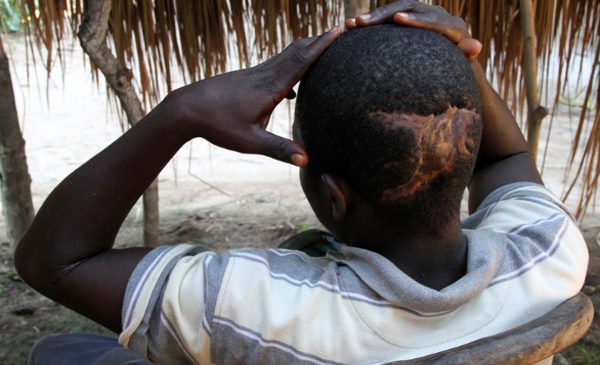By Maya Mailer, Oxfam Great Britain Humanitarian and Conflict Policy Advisor
Across central Africa, men, women and children live in fear of the Lord’s Resistance Army. This predatory group attacks women as they perform their daily tasks – fetching water or tending to their fields – and children returning from school. It abducts, mutilates, rapes and kills, using extreme violence against the most vulnerable. Survivors are sometimes horribly mutilated – scarred for life, with their ears or lips cut off, as a warning to others.
The LRA has become the most deadly militia in eastern Congo, with Christmas time marked by appalling massacres. At Christmas 2008, the LRA savagely beat to death more than 800 people. They attacked again last Christmas. Local communities say they are scared this Christmas will bring yet more violence and that they feel abandoned by the outside world.
In the past two years more than 400,000 people have fled their homes as the LRA rampaged through remote villages in Congo, Central African Republic and Sudan. With its origins in northern Uganda, the LRA has become a regional threat. It is undermining stability in an already fragile region, where southern Sudan is set to hold a referendum on secession in January.
Last year, I spent a lot of time in Western Equatoria, the area in southern Sudan worst hit by the LRA. This fertile and beautiful land, full of lush rainforest and fruit trees, should have thrived after the 2005 peace deal ended Sudan’s long-running civil war.
But people who have repeatedly fled LRA attacks told me the most gruesome accounts of suffering – too disturbing to be repeated here. These people were farmers who should have been tending their crops, but were instead living in squalid camps.
I also met the ‘Arrow Boys’ – a group of men and teenage boys armed with traditional bows and arrows who have formed voluntary militias to protect their villages. I asked one whether he still went to school. “We want to get an education,” he said, “but if we want to have a future we need to protect ourselves. So we are giving up our future so that we can be protected now.”
It is absolutely understandable that communities have resorted to defending themselves. But self-defence groups are not the answer and can store up all kinds of problems for the future. Eastern DRC is full of local self-defence groups that have morphed into violent militias. In southern Sudan, where there is a history of politicised inter-communal violence, such groups can heighten existing tensions.
Self-defence groups are civilians doing the work of soldiers – young people putting themselves in harm’s way when their own security services and international peacekeepers are absent. The answer must be that regional governments and UN peacekeeping missions, with strong support from the international community, provide the protection that local people desperately need.
There has been more attention paid to the LRA this year, particularly by the U.S. and African Union. But from this must come concrete actions to make people safer. Past mistakes must not be repeated: previous ill-planned military offensives against the LRA have failed to capture the top leadership and have led to horrific reprisals against civilians.
Non-military solutions to deal with the LRA can be found. Many LRA fighters are themselves kidnapped children and adults who have been forced to commit crimes. LRA abductees must be encouraged to escape and reintegrate back into communities. Local civil society groups have had some success in promoting this strategy but they need more support.
It is no accident that the LRA preys on people living in some of the most underdeveloped corners of central Africa. Government presence and rule of law is limited and there are almost no roads, communications or essential services. Ultimately, it is this underdevelopment, marginalisation and absence of state authority that must be addressed in the border areas where the LRA is free to roam.
This problem isn’t inevitable. Solutions can and must be found so that families can finally sleep in their homes free from fear.
This week, Oxfam, together with 18 other agencies, released a new report on the LRA – Ghosts of Christmas Past: Protecting Civilians from the LRA – setting out recommendations to deal with the threat.
You can also take action by signing a petition calling on the UN to stop the LRA abducting and killing this Christmas.

